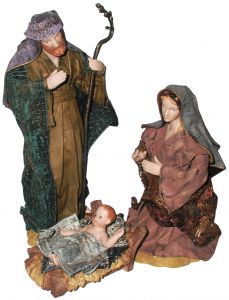
by jphilo | May 3, 2013 | Church Newsletter Columns

“For thus says the Lord:
Do not enter the house of mourning, or go to lament or grieve for them….
Behold, I will silence in this place…the voice of mirth and the voice of gladness…”
Jeremiah 16:5,8
I love celebrations. Weddings. New babies. Birthdays. Anniversaries. Graduations. Reunions. Housewarmings. Funerals of saints who have entered the promised land. I love them all. So the other day, I was horrified by God’s warning in Jeremiah 16 about what would happen to the kingdom of Judah if the people didn’t shape up in a hurry.
In a nutshell, God said, “Don’t go to funerals and comfort grieving family members. Don’t console hurting people or mourn for the dead. Don’t join in celebrations either. But that won’t be hard, because I’m ending weddings and all other happy events because you have forsaken me and followed after other gods.”
My party-loving heart shriveled at this picture of a world devoid of consolation or celebration. “My God,” I whispered, “You are describing hell on earth.”
I can imagine nothing worse than a world without God’s compassion and kindness displayed by those who reach out to others in times of great sorrow, by those who gather to rejoice in times of great celebration. Without these simple acts of shared sorrow and joy, we don’t fully experience the presence of God. He is still there, of course, because He is omnipresent. But when we forsake Him and put anything–work, family, material possessions, pleasure, power, reputation, and a host of other idols–ahead of Him, we are not in the place where He chooses to rain down grace through fellowship with His saints.
My faithful heart doesn’t want to be in that place, though my wandering eyes and fickle feet often lead me there. It’s not the place God wanted Judah to be, or He wouldn’t have sent Jeremiah to warn them to change their course. It’s not a place where God wants you, His adopted child in Christ to be, either.
God wants His children to be in right relationship with Him and one another. He made us for relationship with Him. He places an emptiness in each of us only He can fill. Only when it’s filled with Him are we able to share the kindness and compassion of Christ with lost and hurting people. Only then are we able to mourn with those who mourn and rejoice with those who rejoice.
Only then is the power of Christ unleashed in the lives of others. Stony hearts grow soft. The deaf hear Jesus calling to them. Blind eyes open to the presence of God. Thirsty souls drink the elixir of life. The hungry eat everlasting bread. The lame walk in the place where the grace of Christ rains down.
When we mourn with those who mourn and rejoice with those who rejoice from the vantage point of a right relationship with God, we experience the certain presence of God. Our daily offerings of the kindness and compassion of Christ in fellowship with the saints are, most certainly, glimpses of heaven on this earth.

by jphilo | Apr 1, 2013 | Church Newsletter Columns

Mary Magdalene came, announcing to the disciples,
“I have seen the Lord,”
and that He had said these things to her.
John 20:18
I love the resurrection story in John 20. Maybe because we’re both women, I identify with Mary Magdalene’s emotions.Her initial despair when she sees the empty tomb.
Her determination to carry Jesus’ body all by herself in a vain attempt make things better. Her joy when Jesus said her name, and she recognized the resurrected Lord. Her immediate obedience when Jesus commanded her to tell the disciples.
Then again, I’m not very proficient at the immediate obedience thing. If I’d been in Mary’s place, Jesus’ command to proclaim the resurrection of a man who three days ago had been declared dead, dead, dead would have stopped me cold. Because I would have made an excuse out of what Mary surely understood back in her day.
Without proof or the collaboration of other credible witnesses, no one would believe her claim that Jesus was alive. Besides, she was a woman, and before Jesus came along, women didn’t count for much. Especially not to the Jewish leaders who sent Jesus to his death and wanted him to stay dead, dead, dead.
How did Mary find courage to obey? I think the answer is found in verse 17 where Jesus calls her by name. “Mary,” he says, and she responds, “Raboni.” Then, she clings to the One who rose from the dead, the One who turned her despair into hope, the One who restored purpose to her life.
When the One who called her by name commanded her to spread the word, she held onto hope implicit in his resurrection. Clinging to hope, she made no excuses. She stood firm in the truth. She refused to water down the message.
She ran to the disciples and announced, “I have seen the Lord!”
Today, with Easter music still ringing in our ears, the celebration of Jesus’ resurrection lifts us up. Jesus bids us cling to the hope found in the empty tomb. He calls each of us by name and commands us to announce the truth to a waiting world.
Jesus is risen!
The tomb is empty!
Death has lost its sting!
Our Savior lives!
In the wake of Easter, with the empty tomb behind us and a world perishing without hope before us, will we follow the example of Mary Magdalene? Will we obey and proclaim what we know to be true?
We have seen the Lord!
He lives!
Photo Credit: www.freedigitalphotos.net

by jphilo | Mar 1, 2013 | Church Newsletter Columns

Grace and peace be multiplied to you
in the knowledge of God and of Jesus our Lord;
2 Peter 1:2
Don’t quote me on this, but my gut feeling is that Simon Peter didn’t coin the phrase “Good Friday.” For him, that Friday was not his best day. Not only did the man for whom he risked everything–home life, a fishing business, and his reputation–die on the Friday before Passover, but Peter bore a boatload of guilt. While he watched Jesus die on the cross, conversations from the previous day must have played in his mind.
The slave girl asking, “You’re not one of this man’s disciples are you?” To which Peter replied, “No, don’t know him.”
The question the soldiers asked when he stood with them by the fire. “You’re not one of his disciples, are you?” And his quick response, “Nah, don’t know the guy.”
And to the slave who thought Peter had been in the garden with Jesus, the disciple replied, “No, not me. I don’t know the man.”
Three times Peter denied the truth.
Three times Peter denied knowing Jesus.
Three times Peter denied knowing the Son of God.
Which could explain why Peter hammers home the importance of knowing God in the first eight verses of 2 Peter. In verse two, he prays for grace and peace to be multiplied in believers in the knowledge of God and of Jesus our Lord. In verse three, he says that the divine power to live godly lives comes through the true knowledge of Him who called us. And in verse eight, he says the qualities of faith, virtue, self-control, perseverance, godliness, kindness, and love will increase our true knowledge of our Lord Jesus Christ.
All this from a man who denied knowing God three times. A man who, through Christ’s death and resurrection, through the forgiveness granted him by his risen Lord, and through the power of the Holy Spirit poured out at Pentecost, came to know the truth of words penned by Paul to Timothy: if we are faithless, he remains faithful—for he cannot deny himself.
Once Peter knew the truth of God’s faithfulness, he became fearless. Bold. Courageous. Confident. Unstoppable. He proclaimed the truth to beggars, Pharisees, prison guards, and rulers. He refused to quit talking about the God he knew and who knew him. The God who loved the disciple who denied him three times. The God whose power turned the blackest day in human history into Good Friday.
God’s transforming power should make us long to know God as much as Peter longed for us to know his Savior. It should make us long to know the God who loves us despite our sin and shame. It should make us long to be changed from sniveling deniers of God into bold proclaimers of his glory. Peter’s transformation should make us long for lives redeemed by the surpassing value of knowing Christ Jesus our Lord.
Like Peter, we should pray for desire to know the God who can turn our worst days, through the power of Christ, into Good Friday.

by jphilo | Feb 1, 2013 | Church Newsletter Columns

Behold, we consider those blessed who remained steadfast.
James 5:11
Hiram and I saw the Lincoln movie before Christmas. We left the theater profoundly impressed by Lincoln’s steadfast determination to end slavery, no matter the cost. The film motivated me to check out the audio version (all 36 CDs) of A Team of Rivals, the book upon which the movie is based.
Doris Kearns Goodwin, the historian who penned this fascinating read–or listen–traces the lives of the four Republican contenders in the 1860 presidential race. Lincoln won the presidency, though his childhood was disadvantaged, and he had a much smaller political base than did the other candidates vying for the office. After winning the presidency, Lincoln appointed the three rivals to his cabinet. Edward Bates of Missouri became Attorney General. New York’s William H. Steward became Secretary of State, and Salmon P. Chase of Ohio was appointed Secretary of the Treasury.
So why did Lincoln rise above the other contenders? How did he escape obscurity and become our nation’s greatest president? The more I read of him, the more Lincoln’s lifelong steadfastness emerges. From a young age, he wanted to make a difference. He believed he could make a difference and had a purpose to fulfill. To accomplish it this man, who had less than a year of formal schooling, read constantly and widely. He continued reading and learning long after he passed the bar exam. During his forties, when he was an Illinois circuit court lawyer, he took Euclid’s geometry with him from town to town and mastered the subject. When political opportunities arose, he steadfastly pursued them. Eventually, he became president.
Though Lincoln wasn’t a dedicated church goer, he read the Bible throughout his life and found solace in it as the Civil War raged. Definitive proof of his faith has never been established, but the proof of his steadfastness is unassailable. Because of his steadfastness, a great evil of American society was abolished. Because of his steadfastness, future generations of citizens were and are being blessed.
And I often wonder what would happen if we, who profess to be Christians and have many more advantages than did Lincoln, were as steadfast as the sixteenth president was. How would God move with power in the lives of steadfast people committed to his will? What evils of society would be abolished? What good purpose would God accomplish through us? What blessings would we pass along to future generations?
For this very reason, make every effort to supplement your faith with virtue,
and virtue with knowledge,and knowledge with self-control,
and self-control with steadfastness, and steadfastness with godliness,
and godliness with brotherly affection, and brotherly affection with love.
For if these qualities are yours and are increasing,
they keep you from being ineffective
or unfruitful in the knowledge of our Lord Jesus Christ.
I Peter 1:5–8
photo credit: stock.xchng

by jphilo | Jan 4, 2013 | Church Newsletter Columns

And the angel said to them, “Do not be afraid;
for behold, I bring you good news of great joy,
for today in the city of David there has been born to you a Savior who is Christ the Lord. Glory to God in the highest,
and on earth peace among men with whom He is pleased.”
Luke 2: 10–11,14
Joy suckers. During the weeks before Christmas, the news was full of them.
Polio eradication workers in Pakistan killed by terrorists.
Fire fighters in Webster, New York shot when they responded to a house fire call.
Children and teachers gunned down at Sandy Hook Elementary School.
“How,” the watching world asks, “could Christians rejoice over the birth of Jesus in times like these? Why did they feast and give gifts as though nothing happened?”
“How indeed?” Christians wondered. “How can we celebrating light in the midst of such darkness? Shouldn’t we sit in the dark and grieve instead?” And so our guilty thoughts began, along with doubt and fear and self-loathing.
Joy suckers, all of them.
Waiting to extract every bit of gladness from the hearts of God’s people.
Eager to settle on our shoulders a mantle of gloom and sadness.
Ready to burden our hearts and bow our heads, so we succumb to dark despair.
Two thousand years ago, into a world as black as ours seems today, God sent his Son as a light in the darkness. And the joy suckers could not comprehend it.
They could not comprehend that God would allow a baby born in a manger to become a man who would be killed for doing what was right.
They could not comprehend that God would allow the healer of the sick to die at the hands of terrorists.
They could not comprehend that the Father loved the world so much, He willingly experienced the heart-wrenching death of his own Son.
But two thousand years ago, the Lord of hosts understood it all.
He understood that on Christmas Eve of 2012, the families of two fire fighters in Webster, New York would need the assurance of a God who knew what it felt like to die for doing the right thing.
He understood that on December 19, 2012 the loved ones of nine dead health workers in Pakistan would need the comfort of the great physician slain by an angry mob.
He understood that on December 14, 2012 the parents of twenty dead children would need a Savior who, like them, had anguished over the death of a child.
The joy suckers couldn’t comprehend such light, such love. But we, His broken children, can.
The entrance of God’s light and love into our darkness is why we feasted with our families,
why we gave and received gifts,
why we joined hands and sang carols.
Silent Night
Joy to the World
Hark the Herald Angels Sing.
Because, when we raised our faces to His light and sang,
the darkness tried to hide.
It trembled at His voice.
How great is our God!
Sing with me,
Jolene
photo credit: www.freedigitalphotos.net

by jphilo | Dec 3, 2012 | Church Newsletter Columns

And Joseph arose from his sleep, and did as the angel of the Lord commanded him, and took her as his wife.
Matthew 1:24
And Mary said, “Behold, the bondslave of the Lord;
be it done to me according to your word.”
Luke 1:38
Parenthood is a risky business. Author Elizabeth Stone nailed it when she said, “Making the decision to have a child is momentous. It is to decide forever to have your heart go walking around outside your body.”
The approaching Christmas season makes me wonder, did Joseph understand the vulnerability of parenthood when the unnamed angel appeared to him in a dream? Did Mary understand when Gabriel informed her of the upcoming virgin birth of Jesus? Most likely they did not. What first time parents comprehend the profound and lasting love they will feel for their child?
If Joseph and Mary had completely understood the weight of parenthood, would they have obeyed God so willingly? Would they have accepted the prophecies about Jesus and agreed to parent God’s son? Would they have risked living forever with their hearts walking around outside their bodies?
A search of God’s Word for answers reveals the truth: My questions about parenthood were the wrong ones. The question to ask is not whether Joseph and Mary understood the repercussions of parenthood. The better question to ask is whether they understood the nature of God and trusted him to act according to his nature.
Scripture records how well they understood who God was. The verses preceding Joseph’s decision to obey the angel’s command show the first time dad believed God could conceive a baby through the power of the Holy Spirit, thus fulfilling the century-old prophecy in Isaiah.
Mary’s words to her cousin Elizabeth in Like 1:46-55 clearly shows the future mother’s grasp of God’s character. Not only does she recognize God’s ability to work miraculously in her life, she also recognizes his hand as he works through the lives of people and the history of nations to fulfill his promise to Abraham’s offspring.
Joseph and Mary didn’t need to understand the profound changes parenthood would bring to their lives. Rather, they needed to know God was who he declared himself to be. They needed to know who he was so they could trust him with their son’s life, even before he was born. So they could trust him with their vulnerable parent hearts, which once they laid eyes on their baby in a dark and dingy manger, walked forever outside their bodies.
Likewise, we need to know God as Joseph and Mary did because, not just parenthood, but all of life is risky business. It’s too risky to face without sure knowledge of a God who loved the world so much he sent his only begotten Son. A baby born in in a manger. Immanuel. God with us. Only then, in the face of uncertainty and risk, can we echo Mary’s words:
My soul exalts the Lord,
And my spirit has rejoiced in God my Savior…
For the Mighty One has done great things for me;
And holy is his name.







